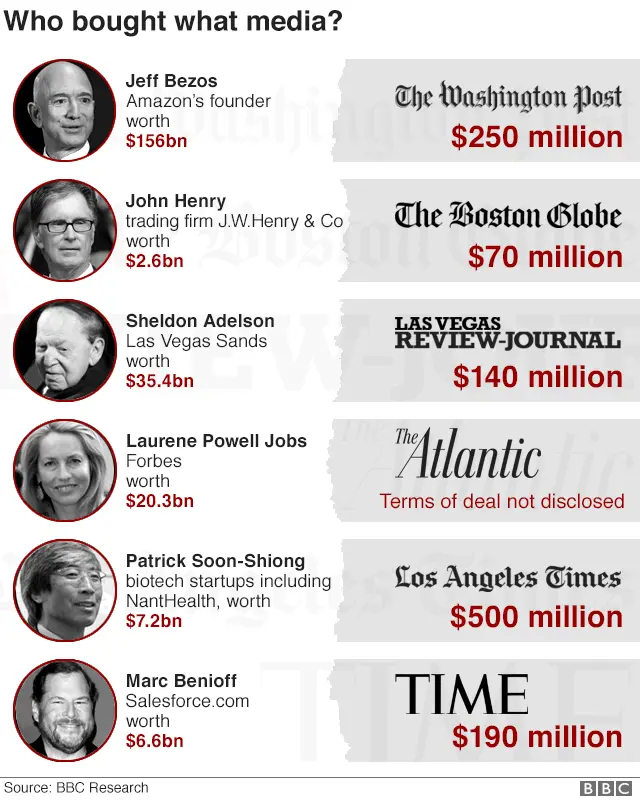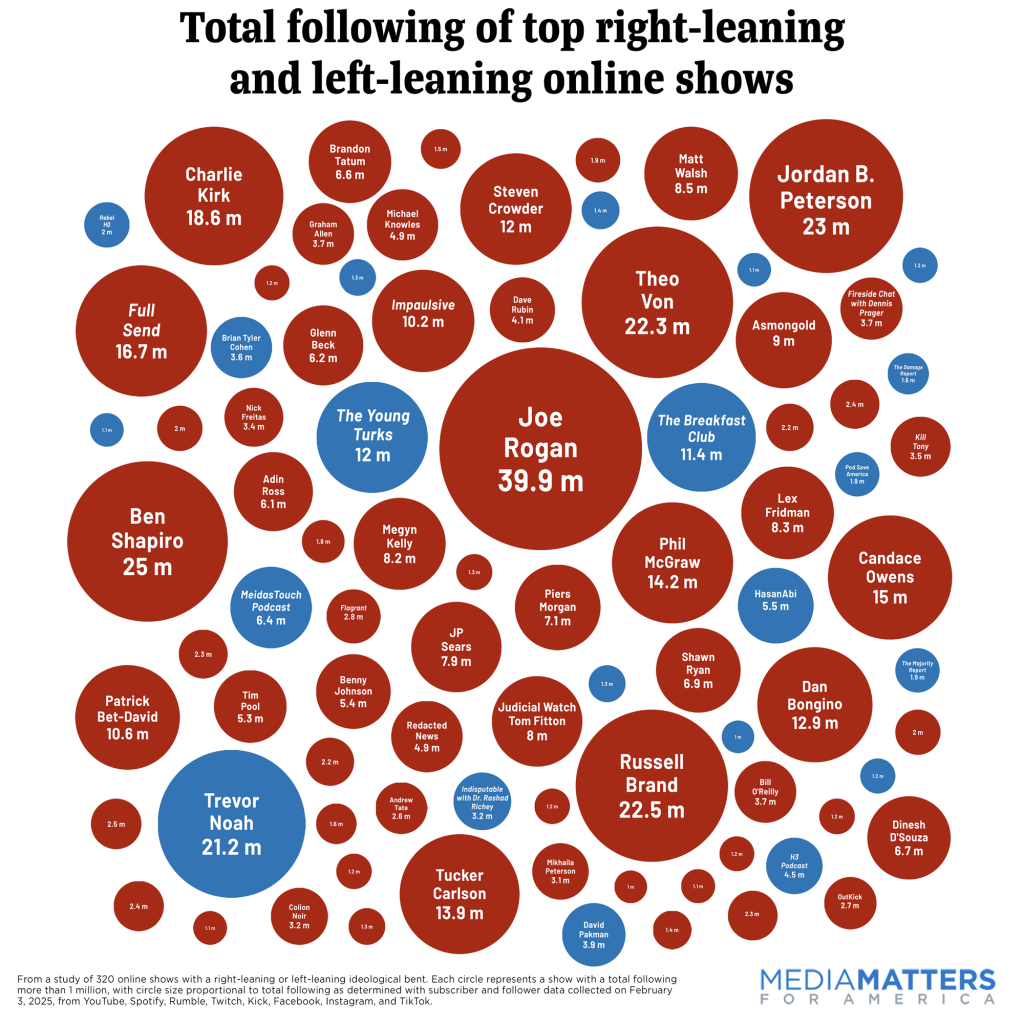In today’s rapidly evolving digital landscape, media plays a pivotal role in shaping public opinion, influencing political discourse, and defining cultural narratives. One organization that has emerged as a key player in this arena is Media Matters, an influential progressive research and information center dedicated to monitoring and countering conservative misinformation in U.S. media. As the digital media ecosystem becomes increasingly polarized, understanding the role of Media Matters is more important than ever.
The Rise of Right-Leaning Online Media
A recent report by Media Matters for America highlights a stark reality: right-leaning online content dominates the digital space. According to their analysis, nine out of the top ten online shows are right-leaning, with a combined following of over 197 million subscribers and viewers across platforms. The only left-leaning show to make the top ten? Trevor Noah’s “What Now?” with 21.1 million followers.
The numbers are staggering. Right-leaning online shows have amassed nearly 481 million followers, compared to just 104 million for left-leaning shows. On YouTube alone, right-wing channels have recorded 65 billion views, while left-leaning content reached 31.5 billion views. These figures underscore a significant imbalance in the digital media landscape.
This isn’t just a coincidence — it’s the result of a deliberate, well-funded strategy to colonize the digital media space with conservative voices. While left-leaning creators often rely on Patreon donations and merchandise sales, right-wing personalities are frequently backed by billionaire investors, enabling them to build professional media operations with high production values and massive marketing budgets.
The Power of Billionaires in Shaping Media Narratives

Several billionaire families and investors have played a crucial role in funding the growth of right-leaning media. The Kochs, the Mercers, the Thiels, the Murdochs, and the Uihleins are not just wealthy individuals; they are kingmakers who understand that investing in media is investing in political power.
Take The Daily Wire, co-founded by Ben Shapiro. What started as a modest conservative website has grown into a multimedia empire, producing movies, children’s content, and multiple top-performing podcasts. This expansion was made possible through $4.7 million in funding from Texas fracking billionaires Dan and Farris Wilks.
Similarly, Rumble, a “free speech” alternative to YouTube, has become a haven for right-wing content creators. Peter Thiel, a prominent Trump supporter and venture capitalist, is among its key investors. With his backing, right-wing online shows have gained billions more views, further cementing their influence.
Even Elon Musk’s acquisition of Twitter (now X) has reshaped the digital landscape in favor of right-wing voices. Musk has personally amplified far-right content to his nearly 220 million followers, and changes to the platform’s algorithm and moderation policies have benefited right-wing accounts. His direct payments to right-wing influencers through X’s creator program further illustrate the financial backing of these voices.
The Infiltration of Non-Political Spaces

One of the most insidious aspects of this right-wing media dominance is how right-leaning content has seeped into supposedly non-political spaces. According to a Media Matters analysis, 72% of online shows that self-identify as non-political are actually right-leaning.
Comedy podcasts like Joe Rogan’s (39.9 million followers), Theo Von’s (22.3 million), and the Nelk Boys’ “Full Send Podcast” (16.7 million) don’t explicitly brand themselves as political content. Yet they regularly feature right-wing figures and advance conservative narratives under the guise of casual conversation or humor.
These 15 right-leaning comedy shows alone account for 117.5 million followers — 20% of the total following across all 320 ideological shows analyzed by Media Matters. In the lead-up to the 2024 election, Trump and Vance appeared on six of these comedy shows a total of nine times, generating nearly 120 million views on YouTube.
This infiltration works because it doesn’t present itself as political propaganda. It’s just “bros talking about life,” making jokes, and occasionally hosting a presidential candidate or anti-trans activist. But behind many of these seemingly independent creators? Conservative money.
The Funding Desert for Progressive Media

In contrast, progressive online media operates in a funding desert. While right-wing creators enjoy the backing of ideologically motivated billionaires, left-leaning voices must navigate a fragmented landscape of smaller donors, subscriptions, and advertising — all while competing against the right’s well-oiled promotion machine.
Major progressive donors have largely focused their resources on policy organizations and civil society groups, rather than building a comparable media ecosystem. George Soros, often vilified as a liberal boogeyman, has primarily directed his giving toward traditional political campaigns, issue advocacy, and nonprofit journalism rather than investing in the creator economy.
Even when progressive funders do support media, they often impose restrictions that make it difficult to build large, sustainable audiences. While conservative backers give their content creators freedom to be entertaining, provocative, and commercially viable, progressive funding often comes with strings attached around messaging, issue focus, and measurable policy impacts.
This approach means left-leaning creators are forced to prioritize substance over style, nuance over engagement, and education over entertainment — all while operating with a fraction of the resources available to their right-wing counterparts.
The Implications for Democracy
This massive imbalance matters for our democracy. As Americans increasingly get their news and form their political opinions online, the overwhelming right-wing dominance of these spaces shapes everything from policy debates to election outcomes.
The 2024 “podcast election” provided a stark example. According to Edison Podcast Metrics cited in the Media Matters report, Trump’s appearances on podcasts and online shows reached 23.5 million American adults in an average week — nearly four times Harris’s reach of 6.4 million. At Trump’s election night victory party, UFC President Dana White specifically thanked online hosts Adin Ross, Theo Von, and Joe Rogan for helping elect Trump.
And they deserve the credit. These platforms have become powerful engines for mainstreaming right-wing narratives, laundering extremist talking points, and creating parasocial relationships between hosts and millions of predominantly young male viewers — relationships that translate into political influence.
More broadly, this asymmetry distorts our collective understanding of reality. When one political perspective dominates the information ecosystem by a five-to-one margin, it inevitably shapes how we perceive issues, who we consider authorities, and what policy options seem viable.
The Path Forward for Progressive Media

If progressives want to compete in the digital information space, they need to get serious about building and funding an ecosystem that can rival the right’s dominance.
This doesn’t mean mimicking the dishonesty and extremism that characterizes much of right-wing media. But it does require acknowledging some uncomfortable truths: entertainment values matter, production quality matters, marketing matters, and yes, money matters.
Progressive donors need to take a page from the conservative playbook by making long-term, substantial investments in digital media with fewer strings attached. They need to fund not just serious policy content but also entertainment, comedy, sports, and lifestyle content that can reach beyond the already converted.
More importantly, they need to recognize that building media power is not secondary to political organizing — it’s an essential prerequisite. In an era when a single podcast host can reach more people than all the major cable news networks combined, media isn’t just about informing people about progressive policies; it’s about creating the cultural and informational environment where those policies can even be considered.
The right understood this decades ago when they began building their media apparatus. They knew that owning the megaphones was just as important as having something to say into them. It’s long past time for progressives to learn the same lesson.
Conclusion
As the digital media landscape continues to evolve, the role of Media Matters in monitoring and countering conservative misinformation becomes increasingly vital. Their reports reveal a stark reality: right-leaning content dominates online platforms, supported by a well-funded network of billionaires and investors. Meanwhile, progressive voices struggle to gain traction in a funding desert.
For democracy to thrive, it’s essential that progressive media ecosystems receive the support needed to compete on equal footing. Only then can the public access a balanced, diverse range of perspectives that reflect the complexity of modern society.
Stay updated with the latest news and insights on how media shapes our world.
Author: Parker Molloy
Title/Role: Journalist and Writer
Credentials: Author of The Present Age, a newsletter exploring communication in a hyperconnected world.
Profile Link: parkermolloy.com
Sources:
– Media Matters for America
– Edison Podcast Metrics
– The Present Age Newsletter
Internal Links:
– Understanding the Impact of Social Media on Politics
– How Billionaires Shape the Media Landscape
– The Future of Progressive Digital Media
Schema Markup:
{
"@context": "https://schema.org",
"@type": "Article",
"headline": "Understanding the Role of Media Matters in Modern Journalism",
"datePublished": "2025-04-05",
"dateModified": "2025-04-05",
"author": {
"@type": "Person",
"name": "Parker Molloy"
},
"publisher": {
"@type": "Organization",
"name": "US Trending News",
"logo": {
"@type": "ImageObject",
"url": "https://example.com/logo.png"
}
},
"description": "Explore how Media Matters is shaping the future of journalism and countering conservative misinformation in the digital age."
}
Featured Snippet Optimization:
Media Matters is a progressive research and information center dedicated to monitoring and countering conservative misinformation in U.S. media.











More Stories
US Trending News: The History and Legacy of Zoo York in Streetwear Culture
US Trending News: The ‘Your Mom’ White House: A Trendy Take on Political Humor
Understanding ‘You Got That Right’ in The New York Times: Context and Implications